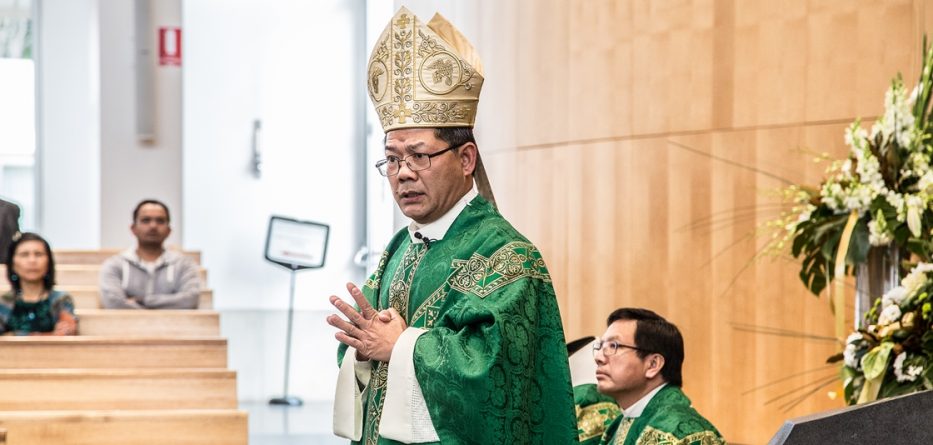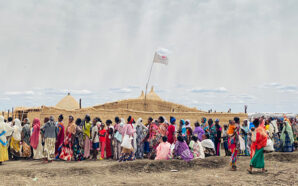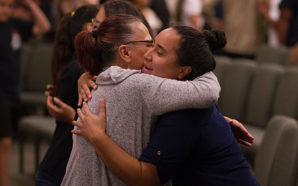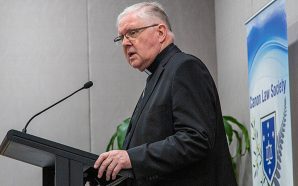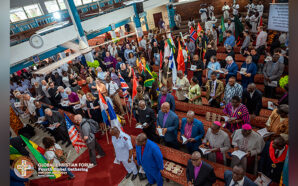Homily given by Most Rev Vincent Long OFM Conv, Bishop of Parramatta
Holy Mass of the 31st Sunday in Ordinary Time, Year C, with the Institution of Lectors at Our Lady of the Rosary Parish, St Marys, Sunday 30 October 2016.
Dear friends in Christ,
In the digital age, book reading can be a real struggle. I came across a book which I read with much interest. It is called “far from the tree” referring to the saying that the apple never falls far from the tree. Like father, like son, we would say.
This book, however, delves into the unusual subject of how parents deal with children whose identities fall outside of their own and as such are more difficult to be accepted and loved. They are children who are disabled, autistic, deaf, schizophrenic, dwarf, transgendered; children who are born with a propensity for violence and criminality, etc.
It is a fascinating examination of the accommodation of difference and ultimately an affirmation of what it is to be human. The acceptance and love of parents who raised these ‘difficult’ children can indeed give us a glimpse into the very love of God. Perhaps Zaccheus was one of these apples, which fell far from the tree.
He was someone that only a generous parent could love. The Gospel tells us something unusual about Zaccheus. He was very short and very rich. More importantly, he was a senior tax collector, and as such was considered a career criminal in the eyes of his fellow Jews. As a result, he was ostracised and treated with disdain. As far as they were concerned, he was a traitor who was outside of the circle of the faith community.
Yet Jesus saw him with different eyes. Whereas people saw him with a history and a propensity for evil, Jesus saw in him a dignity and a potential for goodness. Already, the Gospel alludes to this by drawing our attention to the place of their encounter: under the sycamore tree. In biblical terms, the tree is the place of prayer and therefore a metaphor for spiritual receptivity and openness to God. Thus Jesus spoke of Nathanael as a man incapable of deceit, whom he recognised under the fig tree, even before Philip introduced him.
Zaccheus’ openness and receptivity were even more evident during the meal with Jesus at his house. Undeterred by prejudice, he sought to rise above his own sinful past. Zaccheus stood his ground and said to Jesus, “Look, sir, I am going to give half my property to the poor, and if I have cheated anybody I will pay him back four times the amount”.
The mercy of God manifested in Christ had evoked a heartfelt response and a total transformation. A sinner was transformed into a saint in the making. It is truly a story of redemption which is made possible by God’s offer of unconditional love and our response in faith.
This Good News story is in sharp contrast with the preceding story of the rich young man in Luke’s Gospel. Both met Jesus and both were motivated by a desire for a fuller life. The rich young man kept all the commandments and did all the right things by the rule book. Yet like the Pharisees who relied on their merits, he relied on his own resources and went away sad.
Zaccheus on the other hand seemed to have lived outside the rule book for most of his life. Yet at the encounter with Jesus, he was transformed and filled with joy.
What is the difference? We might ask. The difference is in their response. The rich young man did not let go of the security of his wealth. He did not dare to venture outside his comfort zone. He lacked the essential requirement of Christian discipleship: faith and trust. Zaccheus made a faith-filled generous response and received freedom and joy.
Dear friends,
The story of Zaccheus challenges us to look beyond societal or personal prejudices and to recognise everyone’s God-given dignity and potential, including those living on the outmost fringes of society. We are called to believe that no one is ever beyond hope, past the point where God’s grace and love apply to them. In Jesus, God does not give up on people; he is more interested in their future than in their past. The book of Wisdom today affirms God as the lover of life and no one is abhorrent to him. We can learn from Zaccheus who turned his life around as a result of meeting Jesus. The struggles and even the worst moments of life are not dead ends but can be part of our personal story of redemption, thanks to our faith-filled response to God’s love.
Today, we also commend two of our young seminarians for the ministry of lector. We pray for them as they are being formed into instruments of God’s mercy. We pray for young people who look for something more in life that they may find in Christ the pathway to wholeness and joy, even through a radical priestly and religious commitment.
The Christian life is about God’s action and our response to what he is already doing. Jesus reminds us, “You did not choose me, but I chose you.” Zaccheus serves to remind us of who does the choosing and who does the responding. Zaccheus teaches us to learn to listen for the voice of God in our personal lives and respond without holding anything back. He also teaches us to look for Jesus along the road of life.
Brothers and sisters,
Let me conclude with the words of St Paul in our second reading today. “We pray continually that our God will make you worthy of his call, and by his power fulfill all your desires for goodness and complete all that you have been doing through faith; because in this way the name of our Lord Jesus Christ will be glorified in you and you in him, by the grace of our God and the Lord Jesus Christ.”




